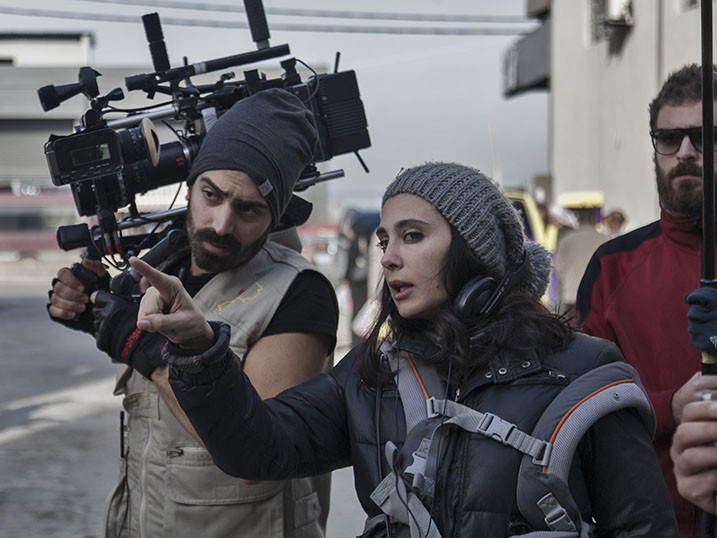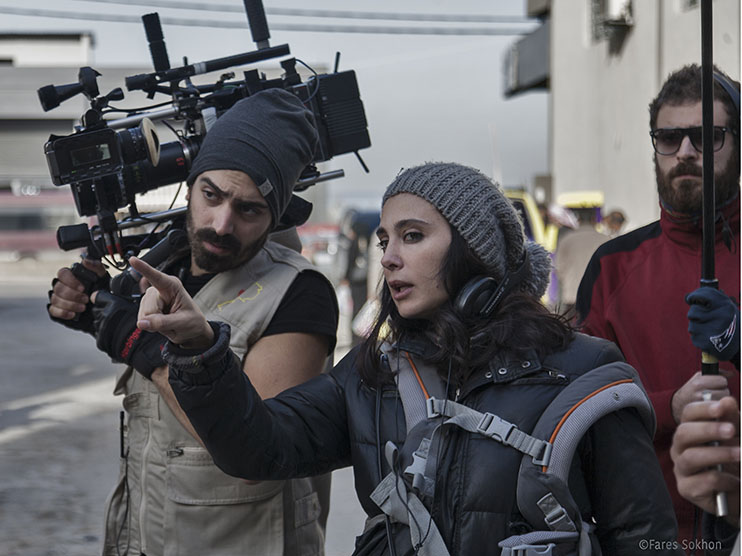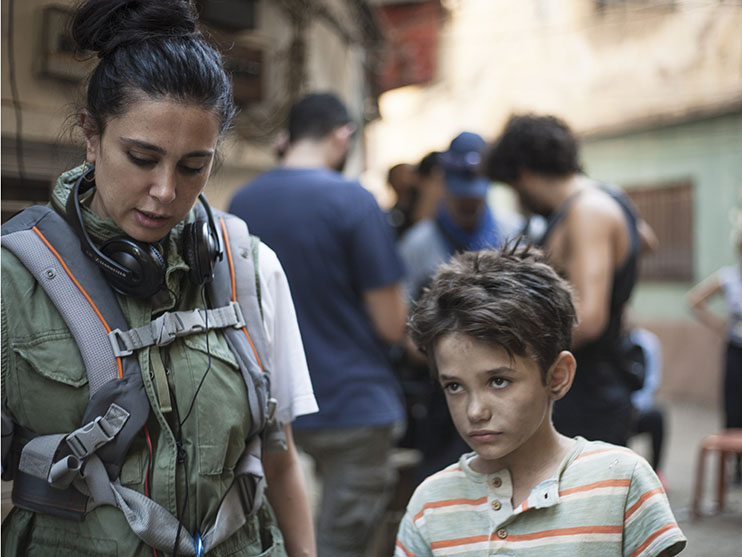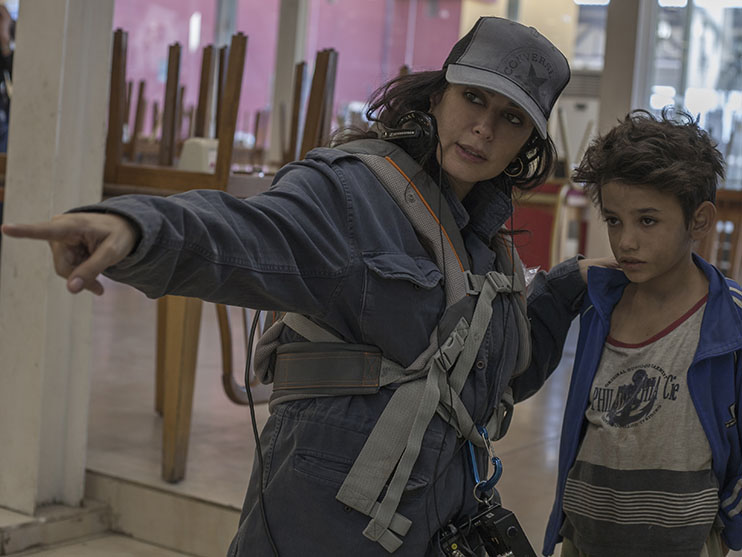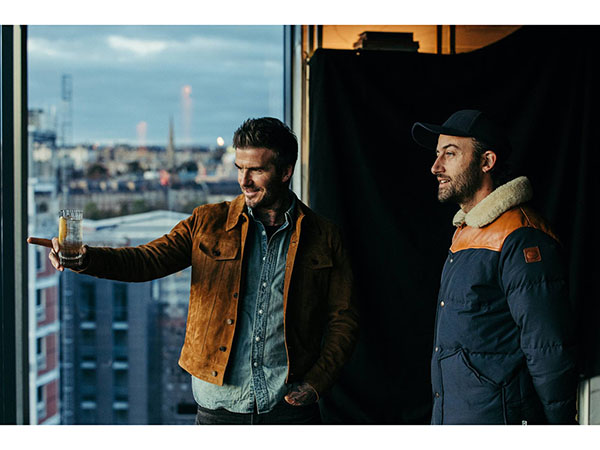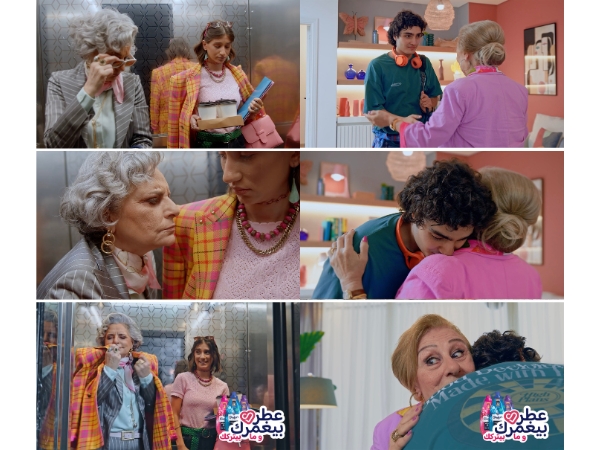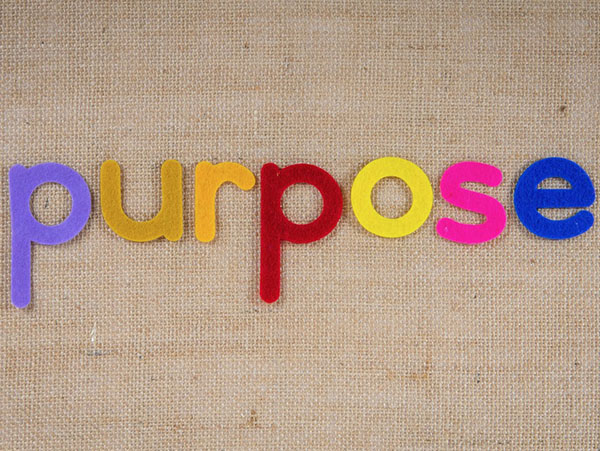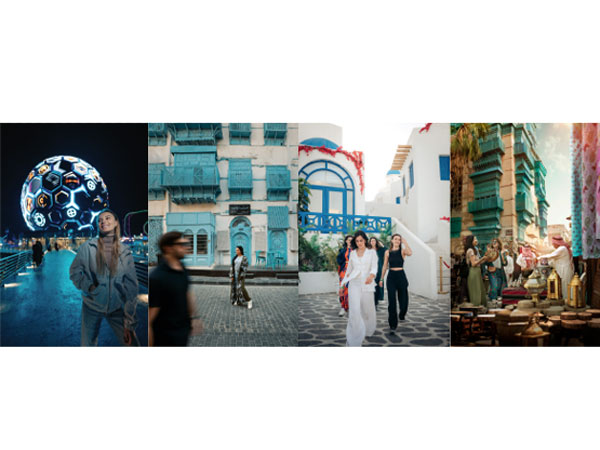Industry Talk
Nadine Labaki:“I believe films have the power to do something”
by Robbie Collin
March 10, 2019

One night Nadine Labaki answered her phone at 3am to learn that her lead actor had been thrown in prison. Days earlier, the Lebanese director had shot a scene for her new film Capernaum in which Rahil, an Ethiopian single mother and refugee, is dramatically arrested by immigration police. She is played by a young Eritrean woman, Yordanos Shiferaw, herself in Lebanon without papers.
'There had been a raid on a house party,' Labaki explains. 'Everybody was without papers, so they took them all.' As well as Shiferaw, the Internal Security Forces had detained the parents of the one-year-old baby also starring in Labaki's film. The arrest of the undocumented migrant workers meant their daughter, Boluwatife Treasure Bankole, was suddenly alone in the world. So the casting director took her in while Labaki and her husband, the film's producer/composer Khaled Mouzanar, scrambled to arrange bail money and work permits that would free the trio, as filming continued.
'You start thinking it's not just a film any more,' Labaki recalls. 'Real life seemed to be getting confused with this fiction I'd written. At the same time, it felt like we were doing something that was bigger than ourselves. We knew that something could happen at any moment that would kill the film for good. So we found this faith that we would keep going, no matter what.'
I meet Labaki three years after filming, in a subterranean cocktail bar in London, where she's refuelling between screenings with gin and olives. In person she's bright-eyed, robustly handsome and subtly power-dressed: trouser suit, white dress shirt and large gold hoop earrings that bounce as she speaks.
Capernaum is a social-realist blockbuster about a 12-year-old Syrian refugee's struggle to survive in the Lebanese capital (it takes its title from the French for 'chaos'), and has already won the Cannes Film Festival's Jury Prize, competed for Best Foreign Language Film at this year's Golden Globes, and was in the running at the Baftas and Oscars this past month. It was inspired by the crises engulfing Labaki's home country - human trafficking, child labour, widespread poverty, political deadlock - and their connection to the ongoing migration crisis, which has seen 1.5 million Syrian refugees settling in Lebanon since the outbreak of civil war in Syria in 2011.
“Real life seemed to be getting confused with this fiction I'd written. At the same time, it felt like we were doing something that was bigger than ourselves.”
The 44-year-old Labaki is no stranger to tumult. She grew up in the Lebanese mountain town of Baabdat ('in shelters and behind sandbags') as the country's 15-year civil war raged. Her grandfather was the owner of the local cinema, and her father Antoine had grown up in its projection room, glued to the reels whizzing through the projector and the dream worlds they contained. Antoine longed to be a director, but the family had no money, so he became an electrician. His daughters, Nadine and her younger sister Caroline, inherited his love of film and would while away the wartime curfews with VHS tapes rented from the shop under their flat.
'It was the same films over and over - the choice was not very great,' she laughs. 'Ferris Bueller's Day Off, Grease - we watched them until the tapes were ruined. It was like a ritual. We used film to dream about a different life.'
The war ended when Labaki was 16. She took a degree in audiovisual studies at Beirut's Saint Joseph University, then moved into advertising. 'It was the only place I could be close to a film camera - adverts were the only things shot on film.' Her first directorial job, at 23, was a public-information piece about child abuse: the studio had no money to hire anyone else. Labaki's early adverts were popular for their witty portrayals of everyday Lebanese life. Then she moved into music videos, which proved scandalous: they showed ordinary women 'not scared of how men looked at them, dancing and being free with their bodies'. One, with the singer Nancy Ajram, caused enough of a stir to be banned in Egypt 'and both of us became very famous overnight', she laughs. It gave her the profile to take on more ambitious, expensive projects, 'which was the only way, because the film business was a desert'.
Labaki isn't religious, but describes her upbringing as conservative Christian: church on Sunday was expected. 'Self-censorship becomes part of your personality living here, with the pressure of the pointed finger when you grow up,' she says. Did it set creative boundaries? 'Only insofar as you work out how to get away with everything.'
Her first feature, 2007's Caramel, grew out of the Cannes Cinéfondation programme, which mentors young directors from around the world. She was encouraged to apply by Belgian producer Anne-Dominique Toussaint, whom she met at the Beirut Film Festival in 2003. Caramel is about a beauty salon in the city and the women who frequent it, and is named after the sugary paste the young Labaki used to watch her mother and friends preparing in the kitchen, 'a place men were forbidden from entering, where stories were told and secrets were shared'.
“I believe films have the power to do something. They humanise a problem that can seem very abstract if all you look at are statistics. I know some will think this is naive - that art is just art. But art can be life-changing. It can open a discussion, plant a seed.”
When casting Capernaum, she sent out a small team to comb Beirut. In lieu of auditions, they filmed interviews with street children, and because the story begins with its young hero asking a judge if he can sue his own parents for giving him life, the scouts concluded each interview by asking the children if they were glad to be alive. Most said no.
They came across Zain Al Rafeea fighting in the street, near the slum where the then-11-year-old had lived with his parents since fleeing Syria in 2008. After two questions, Labaki knew she had found her young lead. 'A boy who has grown up on the street has a way of standing, a certain arc in his back, that you can't cheat,' she says. 'You knew from Zain's body language and eyes that he had lived this.' The only difference between real Zain and his character, also Zain, for ease, 'is that he has a loving mother and father. But he had never been to school. His playground was the streets. When we started filming, he didn't know how to write his name. But he had this wisdom that seemed to come from nowhere.'
Zain had grown up in poverty in the city of Daraa, and when Labaki visited his home she saw that he slept on the floor with his four siblings; a bed was an unimaginable luxury. His role in the film gave him a stable income: he had been working odd jobs since he was 10, including making supermarket deliveries, against the wishes of his parents, who had been trying to have him tutored at home. But here was a venture that suited everyone. Zain could still make money, and if he was spending all day on a film set, it meant he was safe.
Zain's main companion in the film is an Ethiopian baby called Yonas, played by Treasure, whom he pulls around in a 'pram' made from a skateboard and cooking pot.
The reaction at Cannes to their scenes was one of slack-jawed amazement: among the film's many assets is what must be the greatest performance by a baby in cinema history. 'She's someone who doesn't miss anything!' Labaki laughs. 'Her name is Treasure and she really is a treasure. It's like she has a halo around her. And she reacts to everything that's going on.' Directing a performer who had yet to reach her second birthday was less daunting than you might think - at least for Labaki, a mother of two caring for her own then-newborn daughter, Mayroun, throughout the shoot.
'People say, "How did you direct her?" But it was simple,' she explains. 'I created situations where she would react the right way. At home I was breastfeeding, so I knew she would be sleepy after milk. If she had to cry, I would show her a bar of chocolate, give her half, and withhold the rest. For the scene where she had to refuse a bottle, I put some salt in. If you're a parent, you know.'
Six months of filming gave way to two years of editing, during which Labaki stood in a 2016 municipal election as a candidate for Beirut Madinati ('Beirut is my city'), a grassroots movement that emerged during protests over governmental mismanagement of public utilities a year earlier. The aim was to break the political stalemate, but it didn't work. 'People are scared of not belonging to a particular group,' she says. 'It got to the point where you felt you needed to roll up your sleeves and change things.'
Her plan now is for change through film-making; 'Politics in my own way.' In December she presented Capernaum at the United Nations in New York on the 70th anniversary of the Universal Declaration of Human Rights; she is arranging screenings for Lebanon's Ministries of Justice and Social Affairs, and representatives from the family courts, the UN refugee agency UNHCR and Unicef. 'I don't know if it's going to lead anywhere,' she says. 'But I believe films have the power to do something. They humanise a problem that can seem very abstract if all you look at are statistics. I know some will think this is naive - that art is just art. But art can be life-changing. It can open a discussion, plant a seed.'
As for the Oscar nomination, Labaki says, 'It's a big victory for the actors - most have been struggling to even exist in this world because they are undocumented. To be recognised on such a big platform and having huge exposure will make their voices resonate louder and maybe make them a little bit less invisible than they were before.'
Her next project is a documentary about what she calls 'the adventure' of making Capernaum, which will set out the extraordinary next chapter in the lives of her young leads. After filming, Labaki set up The Capernaum Foundation to help sustain the families who participated in the film and ensure their children were found school places - though she says convincing some of the parents their offspring are better off there than on the streets is 'a daily struggle'.
She also contacted UNHCR in the hope they might resettle Zain and his family elsewhere, as things were getting worse in Lebanon for Syrians. Forms were filled in and interviews carried out: that was in 2016. Two years later, as she prepared to take the finished film to Cannes, nothing had changed. 'All they could tell us was that it was very difficult, there was a whole waiting list, and so on,' she says. But a week after the festival, Labaki got a letter that said Zain's family's application for asylum had at last been accepted, while Treasure would be relocated to her mother's birth country of Kenya, again with the UNHCR's help. Zain's family were resettled not in Sweden, which his character idly dreams of in the film, but to Norway, right next door. One final, happy time, fiction had bled into fact. She last spoke to Zain a few weeks ago on a video call, during which he took her on a tour of his new house, excitedly pointing out the coastline from his window, and the forest nearby where he'd seen reindeer graze. But the very first thing he showed her - shining with pride as he did so - was his brand-new bed.


